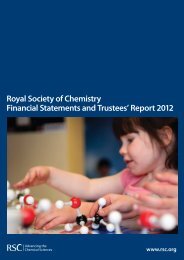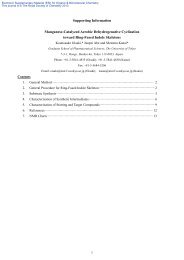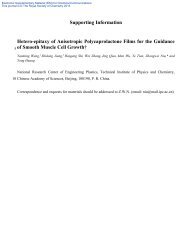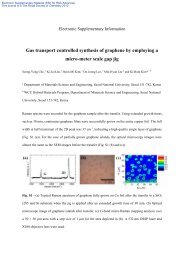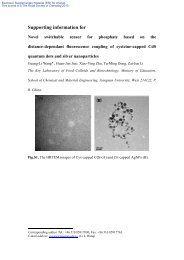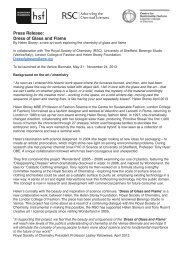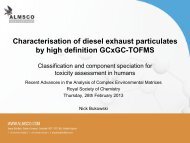Reactions Issue 1 - Royal Society of Chemistry
Reactions Issue 1 - Royal Society of Chemistry
Reactions Issue 1 - Royal Society of Chemistry
You also want an ePaper? Increase the reach of your titles
YUMPU automatically turns print PDFs into web optimized ePapers that Google loves.
2 | <strong>Issue</strong> 1 | April 2007<br />
Schools experiment in cutting edge style<br />
School students in Yorkshire and the South<br />
West will soon enjoy practical chemistry in<br />
cutting-edge university laboratory facilities<br />
instead <strong>of</strong> school. Thanks to projects<br />
funded through <strong>Chemistry</strong> for our Future,<br />
the Universities <strong>of</strong> Sheffield and Bristol are<br />
exploring how they can widen access to their<br />
teaching facilities. A purpose-built schools lab<br />
will be available year-round at Sheffield, while<br />
at Bristol facilities will be <strong>of</strong>fered during the<br />
traditional university downtime <strong>of</strong> Wednesday<br />
afternoons and exam periods.<br />
<strong>Chemistry</strong> for our Future funding is being<br />
used to build the lab at Sheffield which will<br />
be used solely by schools and teachers. Due<br />
to be launched in September, about 1,500<br />
students are expected to use it annually. It<br />
will be available to schools as an open-access,<br />
free resource which can be used in a normal<br />
teaching capacity. Teachers can alternatively<br />
take advantage <strong>of</strong> a series <strong>of</strong> pre-packaged<br />
experiments designed, checked and packaged<br />
by the lab’s dedicated technician – all <strong>of</strong> which<br />
will be relevant to the current A and AS Levels.<br />
Installation <strong>of</strong> the lab begins this month and<br />
local schools will trial the facilities in June and<br />
July.<br />
Simon Jones, Senior Lecturer in Organic<br />
<strong>Chemistry</strong> at Sheffield, is leading the project.<br />
He said: “The new lab will have a double<br />
impact – students will be able to experience<br />
the excitement and fun <strong>of</strong> practical chemistry,<br />
whilst teachers will improve their confidence<br />
<strong>of</strong> teaching experimental science.”<br />
“We’re really hoping schools will come back a<br />
School students enjoying practical chemistry at the University <strong>of</strong> Bristol<br />
second or third time so the students get a chance to meet undergraduates and postgraduates,<br />
and get a good idea <strong>of</strong> what studying chemistry at university is like.”<br />
Meanwhile, at the University <strong>of</strong> Bristol, a coordinated programme <strong>of</strong> curriculum-based practical<br />
activities will be <strong>of</strong>fered to local schools at the £18m teaching laboratories, Bristol ChemLabS,<br />
which opened in February. Funded by HEFCE, with a large capital investment from the<br />
university, the facilities will be amongst the best in the country for teaching practical chemistry.<br />
Activities designed in consultation with local teachers and science advisors will include:<br />
• Two-day taster sessions for year 11 students who have just completed their GCSEs<br />
• A suite <strong>of</strong> experiments for Key Stage 4, AS and A2 level students<br />
• Revision workshops for GCSE students focussing on structure and bonding, energy and<br />
organic chemistry<br />
• Research opportunities for students performing extended A level projects<br />
Trials <strong>of</strong> all the activities will take place with a small number <strong>of</strong> partner schools over the next few<br />
months. The full programme <strong>of</strong> events will be launched in September.<br />
Meeting the needs <strong>of</strong> learners<br />
<strong>Chemistry</strong> for our Future provides a unique, timely opportunity to review higher education chemical<br />
science courses as secondary level teaching undergoes widespread changes. A new range <strong>of</strong><br />
science GCSEs was introduced recently and revised A Level chemistry specifications will follow next<br />
year. Universities need to take these changes into account to make sure that their courses appeal to<br />
prospective students and meet their needs and expectations.<br />
Four curriculum development themes are being explored through <strong>Chemistry</strong> for our Future:<br />
1 Improving the school to university transition<br />
2 Introduction and evaluation <strong>of</strong> context and problem based learning<br />
3 Greater access through distance learning<br />
4 Maximising the benefits <strong>of</strong> European reform<br />
Read about one <strong>of</strong> the new school to university transition projects on page 3.



